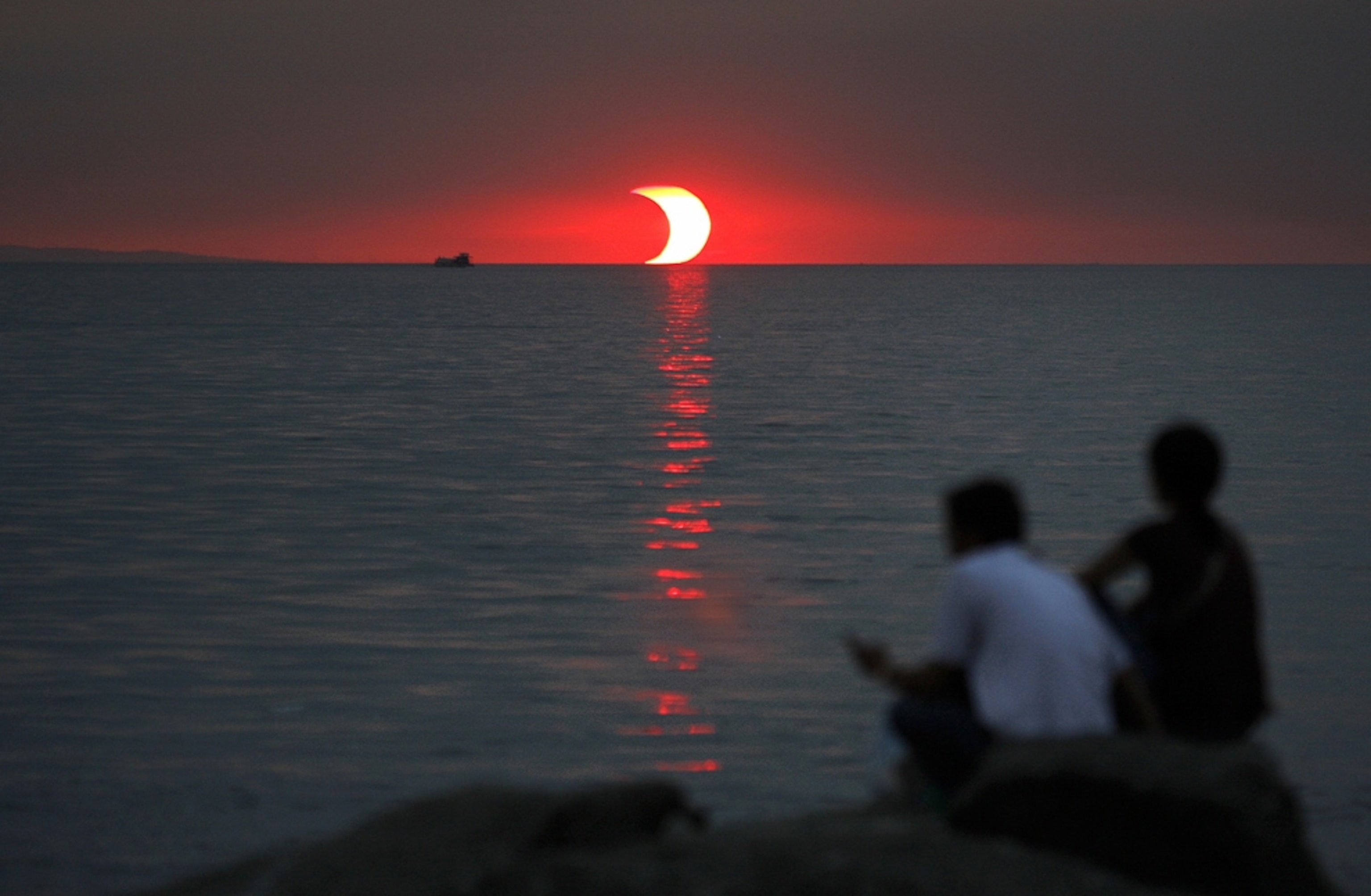
Solar Eclipses Change Weather on Earth (Slightly)
Moon's shadow causes winds to slow, alter direction, study says.
The inky shadows of solar eclipses can alter local weather on small scales, according to new analysis of a 1999 total eclipse.
Solar eclipses occur when the moon slips between Earth and the sun, causing a huge shadow to glide across our planet's surface. (See pictures from a January 2011 solar eclipse.)
Meteorologists knew an eclipse could lower temperatures within this shadow by as much as 5 degrees Fahrenheit (3 degrees Celsius). But they couldn't confirm anecdotal reports of changes in wind speed and direction linked to the astronomical events.
"This story goes back to 1901, when a guy named H. Helm Clayton thought he saw a change in the wind directions on account of the eclipse," said atmospheric physicist Giles Harrison of the University of Reading in the U.K.
Clayton published a paper saying there was such a thing as an eclipse cyclone—"a cyclone of winds around the moon's shadow," Harrison said.
Ever since Clayton's claim, anecdotal reports of eclipse-powered winds have piled up, but without convincing data to support the notion.
(Also see "Eclipses in Ancient China Spurred Science, Beheadings?")
Eclipse's Weird Winds
Looking to put the issue to rest, Harrison and colleague Suzanne Gray, an atmospheric scientist also at the University of Reading, gathered weather data from the path of an August 1999 eclipse.
That eclipse's shadow sliced across Europe, including Devon and Cornwall in the U.K.
During the event Harrison was under cloudy, rainy skies—"the wrong place at the right time" for noticing slight changes in weather patterns. But onlookers elsewhere in the country reported feeling an odd change in wind direction when the eclipse occurred.
(Related: "Planes Create Weird Clouds—And Snow, Rain Fall Out.")
Fortunately, stations across Europe recorded a wealth of weather data under clearer skies.
Gray and Harrison used the pre-eclipse conditions and computer modeling to create a forecast for that day that did not account for the eclipse's shadow. The researchers then compared their results to actual weather data logged during and after the event.
The comparison showed a significant decrease in wind speed of about 1.6 miles (2.5 kilometers) an hour. Winds also blew 20 degrees more southerly in the shadowed regions.
"When the eclipse influences temperature, it seems to also cause the wind to drop and change direction. This is perhaps what people have remarked about," Harrison said.
Wind Changes, but No Cyclone
The researcher cautioned that the new findings are not confirmation of Clayton's full-blown eclipse cyclone.
If nothing else, though, the research is an excellent test of today's weather-predicting technologies. (Related: "Faster Supercomputers Aiding Weather Forecasts.")
"It's amazing how much fine detail you can get out of a modern weather forecast," he said. "There's no model for eclipse weather yet, but you could make something to do that."
The study of solar eclipse-induced wind changes was published March 14 in the journal Proceedings of the Royal Society A.x,dkkd
The inky shadows of solar eclipses can alter local weather on small scales, according to new analysis of a 1999 total eclipse.
Solar eclipses occur when the moon slips between Earth and the sun, causing a huge shadow to glide across our planet's surface. (See pictures from a January 2011 solar eclipse.)
Meteorologists knew an eclipse could lower temperatures within this shadow by as much as 5 degrees Fahrenheit (3 degrees Celsius). But they couldn't confirm anecdotal reports of changes in wind speed and direction linked to the astronomical events.
"This story goes back to 1901, when a guy named H. Helm Clayton thought he saw a change in the wind directions on account of the eclipse," said atmospheric physicist Giles Harrison of the University of Reading in the U.K.
Clayton published a paper saying there was such a thing as an eclipse cyclone—"a cyclone of winds around the moon's shadow," Harrison said.
Ever since Clayton's claim, anecdotal reports of eclipse-powered winds have piled up, but without convincing data to support the notion.
(Also see "Eclipses in Ancient China Spurred Science, Beheadings?")
Eclipse's Weird Winds
Looking to put the issue to rest, Harrison and colleague Suzanne Gray, an atmospheric scientist also at the University of Reading, gathered weather data from the path of an August 1999 eclipse.
That eclipse's shadow sliced across Europe, including Devon and Cornwall in the U.K.
During the event Harrison was under cloudy, rainy skies—"the wrong place at the right time" for noticing slight changes in weather patterns. But onlookers elsewhere in the country reported feeling an odd change in wind direction when the eclipse occurred.
(Related: "Planes Create Weird Clouds—And Snow, Rain Fall Out.")
Fortunately, stations across Europe recorded a wealth of weather data under clearer skies.
Gray and Harrison used the pre-eclipse conditions and computer modeling to create a forecast for that day that did not account for the eclipse's shadow. The researchers then compared their results to actual weather data logged during and after the event.
The comparison showed a significant decrease in wind speed of about 1.6 miles (2.5 kilometers) an hour. Winds also blew 20 degrees more southerly in the shadowed regions.
"When the eclipse influences temperature, it seems to also cause the wind to drop and change direction. This is perhaps what people have remarked about," Harrison said.
Wind Changes, but No Cyclone
The researcher cautioned that the new findings are not confirmation of Clayton's full-blown eclipse cyclone.
If nothing else, though, the research is an excellent test of today's weather-predicting technologies. (Related: "Faster Supercomputers Aiding Weather Forecasts.")
"It's amazing how much fine detail you can get out of a modern weather forecast," he said. "There's no model for eclipse weather yet, but you could make something to do that."
The study of solar eclipse-induced wind changes was published March 14 in the journal Proceedings of the Royal Society A.